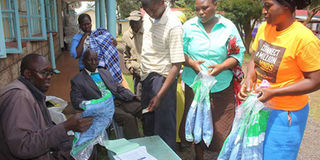Hypocrisy is getting medical aid as leaders go to hospital abroad

A community health volunteer gives out free mosquito nets to Uasin Gishu County residents at Huruma hospital on October 23, 2017. Aid from developed countries has helped to lift many citizens in Africa out of poverty. PHOTO | FILE | NATION MEDIA GROUP
What you need to know:
- Both the US and European countries have been categorical in denying visas to corrupt individuals from Africa.
- Providing aid to countries whose leaders care little for institutions in their own countries is akin to throwing money down a bottomless pit.
Africa has been the epicentre for aid from the developed countries for decades, not surprising as the continent struggles with perennial disasters, both man-made and natural.
At the height of the HIV and Aids epidemic, the world witnessed one of the longest campaigns in recent times to fight the disease with focus on Africa. Money was thrown at governments and NGOs to help fight the disease.
Kibera slum has been the poster child for charities, poverty and diseases in Kenya.
Celebrities from the developed world trooped in to take obligatory photos with the African child with a runny nose as a tear-jerker to rouse people into contributing to charities working in Africa.
The slum alone had one of the largest concentrations of NGOs at one time, most of them funded by donations from Europe, the US and the UN.
FUNDING
At a small fee, tourists could be taken around to ‘enjoy’ the sights and sounds of poverty.
The tours, hence dubbed ‘poverty-porn’, no doubt attracted revulsion from people with conscience.
Countries such as the UK hold annual national events to raise funds for social and healthcare programmes around the world.
A few evenings are set aside as the country follows music, sketches and dance programmes on TV interrupted only by the poor, scrawny African child or a dying Aids patient.
One of the events run by UK comedians Comic Relief has since its formation in 1985 raised £1.3 billion (Sh170 billion). Most of the funds earmarked for Africa.
The international organisation Global Fund sets aside $4 billion (Sh400 billion) a year, according to its website, to support healthcare programmes globally.
Its main interest in Africa is ‘accelerated fight’ against Aids, TB and malaria — and rightly so, as the continent has been beleaguered the most by preventable diseases.
HEALTHCARE
Global Fund had saved over 27 million lives and given out 197 million mosquito nets in its fight against malaria in Africa by 2017.
Yellow fever and Ebola were the recent epidemics tackled with Angola and DRC, respectively, afflicted the most.
However, amid the global efforts in helping Africa to fight preventable diseases is a contradiction: despite medical aid to Africa, healthcare providers in the developed countries lay out the red carpet for ailing African leaders.
Developed countries have been exercising this sense of irony for years by offering the leaders of ‘poor Africa’ luxurious care and stay in hospitals abroad.
What is provided for in medical aid is then taken back through revenue collected by the millions of dollars spent during their hospital stay.
What is not clear is whether the money is paid for from the leaders’ pockets or it is the proceeds of corruption.
Even when states pick up the tab, the developed countries ought to feel ashamed.
GRAFT
Corruption has been the biggest challenge to aid in Africa. In 2017, the US government stopped $21 million aid to Kenya’s Health ministry over graft concerns.
With countries like Kenya in the middle of a corruption crisis, the developed countries lending support to the fight against the vice should also scrutinise the amount our leaders spent on healthcare and also education for their children abroad.
It is one thing to provide aid, but another to let avenues such as healthcare and education abroad be open to abuse.
The fee charged for higher education or healthcare abroad is exorbitant. Only a truly honest dollar millionaire could comfortably afford both.
The rest of the African leaders might be relying on embezzled funds to foot the bills.
SANCTIONS
Both the US and European countries have been categorical in denying visas to corrupt individuals from Africa, but they need to do more and not only consider the amount splashed on shopping at high-end stores or exclusive holiday resorts but scrutinise their hospitals and university spending too.
Hospitals and education institutions in Africa stand no chance of improving if their leaders are allowed a free will to spend taxpayers money in developed countries — whether legitimately or through corruption.
Aid from developed countries has helped to lift many citizens in Africa out of poverty and supported its crumbling healthcare facilities.
However, developed countries risk being complicit to corruption if they do not take a closer look at the amounts spent by leaders from Africa in their hospitals and universities.
Providing aid to countries whose leaders care little for institutions in their own countries is akin to throwing money down a bottomless pit.
Discouraging the leaders from using hospitals and education facilities abroad might be the impetus they require to improve facilities back home.
The silence by the West on the contradiction only shows that developing countries are putting profit before ethics.
Ms Guyo is a legal researcher. [email protected] @kdiguyo





